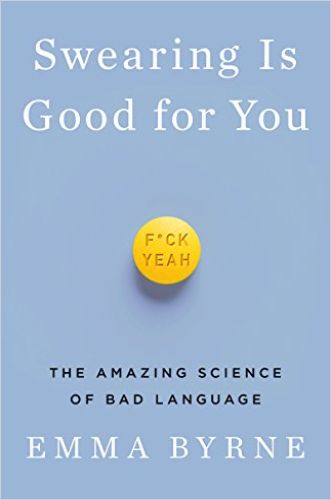Science writer Emma Byrne dissects the joys and catharsis of cursing, complete with scientific, cultural and evolutionary justifications for having a dirty mouth.

Cursing Rules
In this entertaining and profanity-riddled work, roboticist and science writer Emma Byrne – who contributes to Sky News and the BBC – explores the origins, history and power of swearing. She outlines how linguists, neuroscientists and sociologists investigate profanity, along with swearing’s role in the human experience. Byrne notes swearing’s ability to reinforce bonding and alleviate physical and psychological pain, and the differences in cursing behavior across gender and species divides. She emphasizes that, for better or for worse, swearing’s emotional resonance gives it power. If salty language offends you, best to avoid this f*cking book.
The Guardian called Byrne’s book “entertaining and informative.” And, as either a warning or an endorsement, The Scotsman found that “throughout the book, Byrne is an enthusiastic swearer.” The Sydney Morning Herald wrote, “Byrne…likes a good swear, relishes her subject…is playfully astute, and…gives swearing the respect it f*cking deserves.”
Multi-Faceted Linguistic Phenomenon
Byrne submits that swearing is a ubiquitous feature of human language. Swearing embeds in culture, and changes over time as taboos evolve and shift.
Swearing is a bellwether…that tells us what our societal taboos are.Emma Byrne
Byrne posits that swearing is a social signal that mediates interactions in valuable ways. At its core, swearing means speaking words that refer to social taboos. Every language, she notes, has its own swear words because taboos vary from culture to culture.
The author cites a not-entirely-convincing study showing that subjects directed to swear in response to discomfort – their hands in ice water – endured the pain much longer than those told to repeat a neutral adjective. The more potent the swear words, Byrne argues, the more pain relief they deliver. Unwell people, especially the chronically ill, are likely to swear more and find it brings relief.
Workplace Bonding
Byrne raises the obvious when she writes that trusting office relationships are necessary for workplace banter and swearing to have positive overtones. In a safe environment, swearing airs concerns in an emotionally satisfying way and allows team members to express solidarity.
Resisting the swearing culture of an organization can really mark you as an outsider.Emma Byrne
Byrne reminds managers not to use profanity-laced banter with underlings, even if the teams they manage use it among themselves.
Valuable Rhetorical Function
Swearing can make a speaker appear more sincere and honest. Byrne mentions studies showing that people who claim to swear less than others or to know fewer bad words are either more virtuous than average or liars. In one of her more compelling discoveries, Byrne cites how linguists using data from social media found that people who curse in their posts are less likely to show language markers associated with lying. And, in eloquent defense of dirty mouths everywhere, Byrne recognizes that those who swear fluently tend to have broad vocabularies and the ability to change linguistic registers when necessary.
Evolutionary Legacy
According to Byrne, swearing alleviates pain, diffuses frustration, promotes bonding and sends strong signals about arousal, including anger – thus, providing an opportunity to address powerful feelings before they escalate to physical violence.
She amusingly acknowledges studies of chimpanzees, human’s closest biological relatives, that suggest that as soon as chimps have access to language, they start swearing. When scientists taught toilet-trained chimpanzees a word in sign language to represent something taboo (“DIRTY”), for example, they started using it to express anger, disgust or disdain. The chimps, she recounts, used the sign “DIRTY” as an insult, as an intensifier, as a toilet-humor joke and to express frustration.
Swearing Women and Society
Byrne provides a fascinating analysis of the gendered history of swearing: At the beginning of the eighteenth century, a cultural language shift led people to emphasize power as a masculine attribute and purity as an essential quality for women. Men’s language became more direct, and women, Byrne suggests, had to settle for using more euphemisms. She believes that swearing and blunt terms enabled men to express aggression and discuss taboo subjects without social repercussions. She describes how English churchmen associated “foul language” with “foul deeds,” and, thus, women of purity and propriety couldn’t swear and retain their social position.
These days, Byrne says, women reportedly do 45% of public swearing. Swearing is a way of taking up room and claiming power, which violates traditional gender roles.
The way we express ourselves emotionally, even the types of emotion that it is permissible to express, vary widely. Language is culturally laden, and no part of language more so than swearing.Emma Byrne
Byrne reveals that women who swear employ a different vocabulary than men. They employ, she discloses, milder epithets and fewer sexually charged words. She also makes the point that insulting terms for men tend to question their masculinity; insults for women cast aspersions on their sexual behavior and purity.
Justifications
Byrne provides well-written, high-brow justifications for what every adolescent human – and chimpanzee – already knows: Swearing is fun. It makes you feel better, and can amuse others. The author never fully proves the claim in her subtitle; the science she cites is not all that impressive. Most of it seems painfully obvious research into what everyone who likes to curse understands intuitively. But the book is, nevertheless, fun and worth reading. Byrne writes with a light touch, befitting her subject – and who doesn’t want to read semi-serious essays about using bad words, especially when those essays are chock-a-block with bad words themselves?
And if you seek more academic legitimizing of swearing, or enjoy dirty words surrounded by sociological theorizing, you might savor Holy Sh*t by Melissa Mohr; What the F by Benjamin K. Bergen; or How To Swear by Stephen Wildish.





